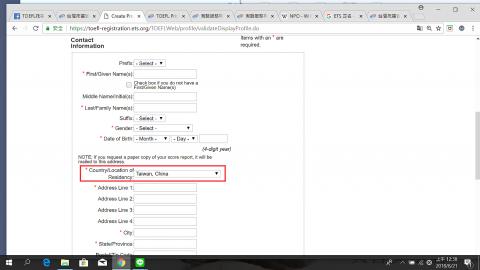Students at a Test of English as a Foreign Language (TOEFL) cram school in Taipei said they were upset when they earlier this month found that the US-based Educational Testing Service (ETS), widely known for examinations it develops for students planning to study in the US, including the Test of English for International Communication, Graduate Record Examinations and the TOEFL, has again changed the way it refers to Taiwan on its Web site to “Taiwan, China.”
The school’s owner, who asked to be identified by his English name, Austin Lin, said some of his students discovered the name change when registering this month for a TOEFL test on the ETS Web site.
Lin said the incident surprised him, because he had heard about Chinese students having their US visa applications rejected or their stays cut short after US President Donald Trump took office.

Photo: Screengrab by Sean Lin/Taipei Times
Such incidents were unheard of during former US president Barack Obama’s time in office, he said.
The Trump administration, which generally takes a more confrontational attitude toward China, has reportedly imposed a stricter policy on Chinese students, due in part to Washington’s concern about Chinese students taking technological know-how they learn in the US back to China, which would intensify the US-China rivalry, Lin said.
It is “disappointing” that ETS, as a non-profit organization with an influential role in education, should get involved, he added.
ETS adhering to Beijing’s “one China” principle was likely motivated by the large number of Chinese students studying in the US, Lin said.
According to the Open Doors 2017 Executive Summary published by the Institute of International Education, Chinese students account for more than 30 percent of international students studying in the US.
“China has continually used its economic power to restrict Taiwan’s international space. It is frightening that such efforts have even penetrated higher education,” Lin added.
He said that the government should step up its efforts to retain local talent, saying that China has wooed away some Taiwanese overseas students by offering them high-paying teaching posts after graduation.
Some students at the school said they had filed protests with ETS.
One student, Chen Kuan-hsien (陳冠憲), said he wrote a letter to ETS to protest the name change.
“I protested that I could not find my country on the registration page, and did not know what to select,” Chen said. “Then I saw ‘Taiwan, China’ — that is not my country.”
Another student, Liu Chiang-yi (劉昌邑), said ETS still referred to Taiwan as “Taiwan” on its Web site when he registered last month for the TOEFL.
In 2006, when ETS introduced the Internet-based TOEFL, it also changed the way in which it referred to Taiwan, changing from “Taiwan” to “Taiwan, Province of China,” which triggered widespread protest among test-takers over how the institute ignored Taiwanese sovereignty.
ETS, saying that the first name change was due to “negligence,” eventually changed the designation back to “Taiwan” after the Ministry of Foreign Affairs intervened and asked it to make the correction.

CHAOS: Iranians took to the streets playing celebratory music after reports of Khamenei’s death on Saturday, while mourners also gathered in Tehran yesterday Iranian Supreme Leader Ayatollah Ali Khamenei was killed in a major attack on Iran launched by Israel and the US, throwing the future of the Islamic republic into doubt and raising the risk of regional instability. Iranian state television and the state-run IRNA news agency announced the 86-year-old’s death early yesterday. US President Donald Trump said it gave Iranians their “greatest chance” to “take back” their country. The announcements came after a joint US and Israeli aerial bombardment that targeted Iranian military and governmental sites. Trump said the “heavy and pinpoint bombing” would continue through the week or as long

TRUST: The KMT said it respected the US’ timing and considerations, and hoped it would continue to honor its commitments to helping Taiwan bolster its defenses and deterrence US President Donald Trump is delaying a multibillion-dollar arms sale to Taiwan to ensure his visit to Beijing is successful, a New York Times report said. The weapons sales package has stalled in the US Department of State, the report said, citing US officials it did not identify. The White House has told agencies not to push forward ahead of Trump’s meeting with Chinese President Xi Jinping (習近平), it said. The two last month held a phone call to discuss trade and geopolitical flashpoints ahead of the summit. Xi raised the Taiwan issue and urged the US to handle arms sales to

BIG SPENDERS: Foreign investors bought the most Taiwan equities since 2005, signaling confidence that an AI boom would continue to benefit chipmakers Taiwan Semiconductor Manufacturing Co’s (TSMC, 台積電) market capitalization swelled to US$2 trillion for the first time following a 4.25 percent rally in its American depositary receipts (ADR) overnight, putting the world’s biggest contract chipmaker sixth on the list of the world’s biggest companies by market capitalization, just behind Amazon.com Inc. The site CompaniesMarketcap.com ranked TSMC ahead of Saudi Aramco and Meta Platforms Inc. The Taiwanese company’s ADRs on Tuesday surged to US$385.75 on the New York Stock Exchange, as strong demand for artificial intelligence (AI) applications led to chip supply constraints and boost revenue growth to record-breaking levels. Each TSMC ADR represents

State-run CPC Corp, Taiwan (CPC, 台灣中油) yesterday said that it had confirmed on Saturday night with its liquefied natural gas (LNG) and crude oil suppliers that shipments are proceeding as scheduled and that domestic supplies remain unaffected. The CPC yesterday announced the gasoline and diesel prices will rise by NT$0.2 and NT$0.4 per liter, respectively, starting Monday, citing Middle East tensions and blizzards in the eastern United States. CPC also iterated it has been reducing the proportion of crude oil imports from the Middle East and diversifying its supply sources in the past few years in response to geopolitical risks, expanding